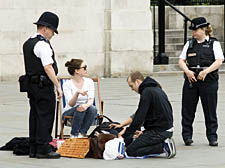| |

Enforcement: Police confront a man and a woman in front of the National Gallery Picture: Dave Cowlard |
Police ‘using hard drinking tactics’
Pressure group claims abuse of power by officers in row about alcohol on the streets
POLICE are abusing powers meant to curb street drinking by confiscating alcohol from the public without evidence of a public nuisance, it is claimed.
Unlawful fines, confiscation and decanting alcoholic drinks into teacups are some of the practices uncovered by an investigation into Westminster’s controlled drinking zones, or “designated public place orders” (DPPOs) as they are officially known.
Within the zones, which cover almost all of Westminster, it is not illegal to drink alcohol – there is no law banning public drinking – but it is a criminal offence to continue drinking when a police officer asks you to stop.
Last week’s investigation by campaign group the Manifesto Club claims police are exploiting public ignorance of the laws, and overlooking the public nuisance condition to enforce a blanket alcohol ban, targeting individuals on a whim.
Such enforcement strategies fly in the face of Home Office advice, they said, and reported one group of picnickers outside the National Gallery being told to pour their lager from cans to teacups despite causing no apparent nuisance or annoyance.
They add that police do not have to justify or even record alcohol confiscation, meaning enforcement statistics are almost non-existent.
The findings of the investigation are laid out in a report titled Robbed by the Police: Alcohol Confiscation And The Hyper-regulation of Public Space, which also details evidence of abuse of police powers across the country.
Dolan Cummings from the Manifesto Club, which is against “the hyper-regulation of everyday life” and supports “free movement across borders, free expression and free association”, said: “Basically what we are seeing is abuse of power by police to treat these zones as if drinking is banned.
“In Trafalgar Square, it was more interesting because the police obviously thought they had to do something, but by requesting that alcohol be poured into a teacup they are really just bending the rules.
“The bottom line here is it’s a quality-of-life issue. Why should be people be stopped from having a drink in public when they’re doing nothing wrong? What we found in Trafalgar Square is interesting in that it represents a privatisation of public space. You can only go there if you conform to someone else’s idea of what is acceptable public behaviour. We are challenging this. We believe in tolerance and not control.”
Home Office guidance to local authorities and police on DPPOs state: “These powers are not intended to disrupt peaceful activities, for example families having a picnic in a park or on the beach with a glass of wine.
“Our advice is that it is not appropriate to challenge an individual consuming alcohol where that individual is not causing a problem. Those enforcing these powered must take care that they do not state (either verbally or via signage) that the consumption of alcohol, in a designated area, in itself, constitutes a criminal offence.”
Westminster police declined to comment. |
 |
|
 |
| |
| |